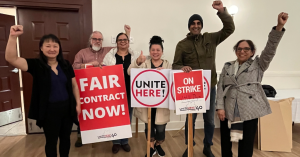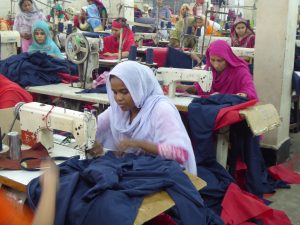香港的勞動力變革


香港的勞動力變革
本報記者林炫禎及總編韋漢忠早前曾與梁祖彬教授探討有關香港勞動力變化事宜。梁在香港乃是一名備受尊重的社會科學家,亦為標準工時委員會成員。在標準工時增加、工潮、標準工時及工作人口分佈變化種種因素下,香港該往何處尋覓出路?近年來,有關勞工待遇及福利的騷動,例如歷時超過一個月的貨櫃碼頭工潮等等都令人感到香港的自由勞動時代已是桑榆暮景。在勞動力市場及福利制度都將發生重大變革下,人們又應作何打算?
近年來,有關勞工待遇及福利的騷動,例如歷時超過一個月的貨櫃碼頭工潮等等都令人感到香港的自由勞動時代已是桑榆暮景。在勞動力市場及福利制度都將發生重大變革下,人們又應作何打算?
香港大學教授梁祖彬先生在是次訪談中提出了多個促成動盪並足以影響未來的要素。
怨聲載道
首先,更民主的香港讓市民敢於發聲,勞工問題自然亦被政治化。經濟增長令人民生活變得富裕,扶貧的意欲亦與日俱增。但公眾認為庫房比他們的「荷包」甚至更為豐碩。當市民收入增加卻仍要面對通脹壓力之際,港府則是年年盈利,他國難以匹比。遂激起一浪浪要求政府改善貧富懸殊問題的呼聲。
這些因素結合起來令政府疲於應對,管治力隨之遭到削弱。在資源分配欠妥下,社會衝突難以避免。
工會在香港的多樣性
工會可謂爭取社會改革的先鋒,它們亦為改變現有狀態不違餘力。然而,不同工會特性不一,它們抗爭手法及受眾各有相異。
由李卓人領導的香港職工會聯盟(職工盟)在貨櫃碼頭工潮中成為了焦點所在,亦不負所望為碼頭工人爭取到底。這類抗爭手法尤如西方上世紀二十至八十年代的工會運動。他們都是標準的局外抗爭組織,致力於對抗當權者。
事實上他們正是與政府就勞工政策進行談判時的局外人,只能靠成員工會透過選票讓組織代表得以在政府眾多委員會中發聲。可惜職工盟的抗爭路線與其他手段比較溫和的大工會相比,支持者實屬少數。
「工會須要轉型。」 – 梁祖彬教授
職工盟與工聯會 – 二虎競食
相反,香港工會聯合會(工聯會)從政府內部進行遊說,在重大政策的實施當中亦有一定發言權。他們屬下的工會數量龐大,成員不乏大型工會,涵蓋行業亦更廣泛,確保工聯會代表可有足夠票數當選要職。
還有一種工會在香港有著不可忽視的影響力,那就是專業人員工會。香港教育專業人員協會以及香港護士協會等等都有著能讓其與資方平起平坐的聲望與權力。
梁提及:「專業人員工會的影響力不容小覷,他們的話語權比起藍領有過之而無不及。」
在眾多選擇中,員工會挑取最有能力代表他們的工會。而工會則在公開場合互相競爭以證明自己能為員工爭取最多利益。在碼頭工潮事件中,職工盟和工聯會各自舉行了多次對立的新聞發布會,兩者都旨在展示貢獻並貶損對手。可見「市場佔有率」主宰著工會的代表權。
工作的未來:標準工時
在本年四月,政府正式就標準工時展開討論。各工會今後向政策施加的渾身解數相信不會令人乏味。作為標準工時委員會的一員,梁指出了討論中的兩個重要議題。第一個是超時工作的賠償問題。工會提議將超時工作的薪金提升百分之五十,故梁認為「標準工時」不過是一個幌子 – 事實上這是一個就超時工作及假期工作進行賠償的議題。
「就這個議題的推進上有兩條前線…一條在於局外的倡議團體,另一條則在於政府制度內部的局內人士。」– 梁祖彬教授
第二個議題在於部份工種的豁免權。部分行業的產品質量遠比工時重要,梁的舉例行業包括售貨員、大學教授、藝術家以及記者等等。
梁並不認為在落實標準工時立法上能夠一步到位。能讓勞資雙方談判的範圍將介於每週四十至四十八小時之間。當問及落實的難處,梁舉出數個問題所在。其中之一為標準工時可能會令中小企因運作成本增加而無以為繼。他認為大公司在管理大量員工及行政上並不會有太大困難。
梁又提到僱主可能會被迫裁員。由於工作流程因行業而異,他們在工作制度的安排上亦會舉步維艱。故而強調在設立標準工時的時候必須權衡各方因素。
梁認為就標準工時立法並非「洪水猛獸」。全球很多地方,包括中國及澳門等地都已相繼實施。但同時他提醒香港在此議題上必須步步為營。
展望將來
當談及香港勞工運動的未來,梁對此並不樂觀。他有感香港作為金融之都,工會化水平偏低。相信與市場以服務業為主,員工因流動性過高而缺乏凝聚力有關。此外,現行的工會法對工會的影響力亦有頗多制肘。他認為更多樣的功能範疇將有助解決問題。
德國以及瑞典的工會功能廣泛,除了大小抗爭外還包括就業及再就業培訓和工資談判,值得香港的工會借鑒。梁又指出北歐工會善於與資方合作促進行業競爭力,而不是拘泥於兩敗俱傷的抗爭。隨著更多工會法出爐,香港的工會已不能再固步自封,他們的未來將取決於自己手中。
原文由港報記者林炫禎以英文撰寫,由港報實習生霍潤文翻譯。
September 11, 2013
資料來源:http://harbourtimes.com/openpublish/zh-hant/node/802
Labour Times: The Changing Face of Work in Hong Kong
Journalist Calvin Lam and Editor in Chief Andrew Work interviewed Professor Joseph Leung (梁祖彬教授) about the changing face of labour in Hong Kong. He is a respected social scientist in Hong Kong who also sits on the Standard Working Hours Committee. With minimum wage rises, strikes, standard working hours and demographic changes in the works, what does the future of Hong Kong hold?
Unrest related to labour and welfare in recent years, including the dockers’ strike which lasted for months feel like the beginning of the end of Hong Kong’s free labour era. Fundamental changes to Hong Kong’s labour market and welfare system are afoot. How can we anticipate and shape what is to come?
In an interview with Professor Joseph Leung Cho-bun from Hong Kong University, he identified a mix of factors influencing the future and driving recent unrest.
Voices Rising
To begin with, a more democratic Hong Kong has encouraged people to voice their opinions more easily. Labour issues are therefore more prone to be politicized.
A strong economy has resulted in people feeling more prosperous, leading to a desire to share the wealth with the less fortunate. The public have seen the government as even more prosperous than they are. While the public makes more, they also struggle with inflation. The government, on the other hand, seems to move from strength to strength with surpluses with no equal worldwide. Accordingly, their voices rise with demands for the apparently rich government to alleviate inequality.
These factors combine to create more demands that the government struggles to accommodate, weakening their authority. Without a proper arrangement of resources, conflicts easily surface.
Unions in Hong Kong: Outsiders, Insiders and the Pros.
“There were two war fronts going … You have pressure groups outside and people working within the system for the government”
Unions have been at the vanguard of demanding social change. They seek to play a role in changing the status quo. However, not all unions have the same character, approach to change or appeal to various workers.
The Confederation of Trade Union (CTU), led by Mr. Lee Cheuk-yan, seemed to have stolen the spotlight during the Dockers strike and have proven themselves in standing up for the workers. This strident approach would not be out of place in Western style union movements from the 1920’s to 1980’s. They are the classic outsiders, working hard to ‘fight the power!’
They are, in effect, the outsiders in negotiation with the government on labour policies. To get a seat at the table on many government committees, the member unions of the ‘confederation’ need to vote for their meta-representative. The confrontational stance seems to appeal to fewer unions than a more collegiate style preferred by the other big union.
“The CTU and FTU work against each other”
The Federation of Trade Unions (FTU), in contrast, works within government committees and has a voice in making key decisions. Their larger membership seems to appeal to a broader base of larger unions, ensuring their voting base gets them a seat at the table.
There is still another group of unions that has considerable influence. The professional unions are strong in Hong Kong. The Professional Teachers’ Union and the Association of Hong Kong Nursing Staff for instance, have prestige and power vis-a-vis their employers.
“Powerful unions are the professional unions……they have more impact than the blue collars”
In the market place of representation, workers choose the groups to represent them. Unions compete fiercely in the public sphere to convince workers they are able to best serve their interests. The FTU and CTU often held dueling press conferences during the dock workers’ strike that seemed aimed solely at showing their contribution and disparaging their rival. Market share is power in union representation.
The Future of Work: Standard Working Hours
It would be interesting to see how unions in Hong Kong will continue to exert their influence with the discussion on standard working hours being brought to the table in April this year. Sitting as part of the Standard Working Hours Committee, Professor Leung mentioned two important issues in the discussion. The first item would be the compensation for working overtime, which the unions proposed the wages to be 1.5 times over the normal wages. He stressed that Standard Working Hours was a misnomer – it was really about extra pay for overtime and working on holidays.
The second item would be consideration of exempt cases, especially in industries which the quality and quantity of products produced are valued more than just being present. He provided examples like sales, professors, artists, and reporters.
In implementing the standard working hour’s legislation, however, Professor Leung said there will be no quick steps. Rather than starting with a standard of 40 hours or lower, perhaps 48 might be the starting point.
When asked about the difficulties in the implementation, he raised several issues. The increase in operational cost for small and medium enterprises might be unbearable. He felt that large corporations would not have difficulty managing their large work forces and administrative capabilities.
Employers might lay off workers and experience work schedule problems as work flow differs across industries. Professor Leung stressed the need to strike a balance among various factors when setting down the standard working hours.
Professor Leung did say he felt that SWH was ‘not something terrible’ and stressed that Hong Kong would likely move cautiously in this area.
Looking into the future
When talking about the future of labour movement in Hong Kong, Professor Leung did not show optimism. Unionization, as he put, was at a low level in Hong Kong. As a financial city focusing on delivering services, it is difficult to unionize people with such high rate of mobility among the workers. Furthermore, the labour laws here do not give unions much power to stretch their arms. “The unions have to transform”, said Professor Leung, who believed unions can be more diverse in what they are doing now.
Unions, like their counterparts in places like Germany and Sweden, can focus on different functions, like training, re-employment and negotiation on wages. He also brought out the example of Canadian unions adopting a collaborative approach to sharpen the competitive advantages of the industry, rather than to confront the employers and result in mutual loss. Now is the time for the unions to transform themselves and with more and more labour laws being enacted, the prospect of unions in Hong Kong depends on their ability to adapt to a changing future.
JUNE 14, 2013
Resources: http://www.harbourtimes.com/openpublish/article/labour-times-changing-face-work-hong-kong




